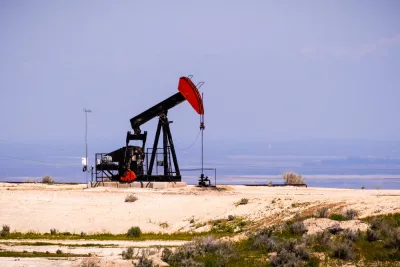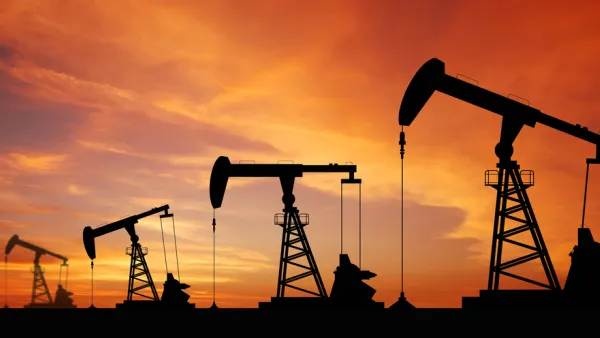Proponents of increased oil drilling in the U.S. to replace banned Russian oil argue that it will decrease prices at the pump. A Texas reporter examined the claim with a University of Texas energy analyst. If only it was that simple.

After wavering between banning imports of Russian oil to punish President Vladimir Putin for invading Ukraine and protecting American motorists from more pain at the pump, President Biden acted on March 8 in favor of the former. Ukraine President Volodymyr Zelenskyy thanked him for taking the bold action that, as President Biden noted, will likely cause world crude oil prices to go higher.
Withholding Russian oil imports, which constituted "3 percent of U.S. foreign imports of crude oil, and about 1 percent of the U.S. supply overall" last year, fourth largest after Canada, Mexico, and Saudi Arabia, according to The Hill (March 8), does create a shortfall in the world's highest oil-consuming nation that will likely "push prices at the gas pump higher when inflation is already rapid," warned Biden last Tuesday.
"Republicans, including Gov. Greg Abbott, have suggested an increase in oil production in Texas could help bring those gas prices down and help the U.S. become energy independent," writes Maggie Glynn, KXAN's capitol correspondent in Austin on March 8.
Abbott tweeted this week, “Instead of begging other countries for oil, Biden can stop hindering the U.S. energy sector. Texas can easily produce enough oil to reduce gas prices if his Administration would get out of the way.”
Oil production and refining
Glynn fact-checks Abbott's assertion with Dr. Joshua D. Rhodes, a research associate with the Webber Energy Group at the University of Texas at Austin.
"We do produce a lot of oil domestically. Just because we get it out of the ground doesn’t mean we can actually refine it," energy analyst Josh Rhodes said Tuesday.
Rhodes shed light on the industry that turns crude into fuel, specifically the types of crude oil that refineries use, and why Russian oil can't simply be replaced by American oil.
"A lot of our refiners, particularly in the gulf coast of Texas are built for this lower quality crude that comes from the Middle East and Russia and Canada. And the crude that we produce is typically higher quality. Counterintuitively, it’s harder for us to actually turn that better crude into gasoline and diesel than it is for the lower quality crude."
However, ramping up oil production in Texas as well as in other states will mitigate the increase in fuel prices, just not in the way Gov. Abbott suggested, particularly if more countries follow in the path set by the U.S. and ban Russian oil imports.
"We can produce more and potentially send more to Europe where they actually are more tooled to process that sweet crude. And so that might be helpful in the short term," Rhodes said.
Not just Republicans
Taking an even more aggressive posture toward increasing American fossil fuel production is Fareed Zakaria, a foreign affairs columnist for The Washington Post and host of GPS on CNN. His column was published on March 3, five days before Biden announced the Russian oil embargo.
Biden should announce that he is going to respond to this massive challenge to the international order by expediting as much production and export of U.S. petroleum as possible to replace Russian energy. With natural gas, he should urge his regulators to facilitate production and he should help more with the financing of liquefied natural gas, so that it can be sent to Europe. He should also encourage countries such as Japan and South Korea to divert more of their liquefied natural gas to Europe. (They have alternative energy sources.) Some of this will take time, but markets will react to the signals and new supplies — and prices will fall.
Comparison to 1979 Iranian oil embargo
"On November 12, 1979, President Jimmy Carter responds to a potential threat to national security by stopping the importation of petroleum from Iran," begins History.com's description of one aspect of the 1979 Oil Shock. But President Biden's position in the current energy crisis that developed after Russia invaded Ukraine on Feb. 24 is far different than Carter's position in 1979, asserts Zakaria.
Today, the United States is the largest producer of oil and gas in the world. It can ramp up production and exports and help open the spigots in other countries. President Biden is worried that he is going to look like former president Jimmy Carter, when his power position is actually more like that of the king of Saudi Arabia.
Related in Planetizen:
- Banning Russian Oil, March 10, 2022
- The Missing Sanctions on Russia, March 6, 2022
- Biden Orders Release from Strategic Petroleum Reserve: What's the Emergency?, Nov. 29, 2021
- New Oil Refineries Queuing Up in Texas, August 1, 2017
- Oil Export Ban Lifted—After 42 Years, December 17, 2015
FULL STORY: Why increasing Texas oil production wouldn’t immediately bring down gas prices

National Parks Layoffs Will Cause Communities to Lose Billions
Thousands of essential park workers were laid off this week, just before the busy spring break season.

Retro-silient?: America’s First “Eco-burb,” The Woodlands Turns 50
A master-planned community north of Houston offers lessons on green infrastructure and resilient design, but falls short of its founder’s lofty affordability and walkability goals.

Delivering for America Plan Will Downgrade Mail Service in at Least 49.5 Percent of Zip Codes
Republican and Democrat lawmakers criticize the plan for its disproportionate negative impact on rural communities.

Test News Post 1
This is a summary

Test News Headline 46
Test for the image on the front page.

Balancing Bombs and Butterflies: How the National Guard Protects a Rare Species
The National Guard at Fort Indiantown Gap uses GIS technology and land management strategies to balance military training with conservation efforts, ensuring the survival of the rare eastern regal fritillary butterfly.
Urban Design for Planners 1: Software Tools
This six-course series explores essential urban design concepts using open source software and equips planners with the tools they need to participate fully in the urban design process.
Planning for Universal Design
Learn the tools for implementing Universal Design in planning regulations.
EMC Planning Group, Inc.
Planetizen
Planetizen
Mpact (formerly Rail~Volution)
Great Falls Development Authority, Inc.
HUDs Office of Policy Development and Research
NYU Wagner Graduate School of Public Service





























